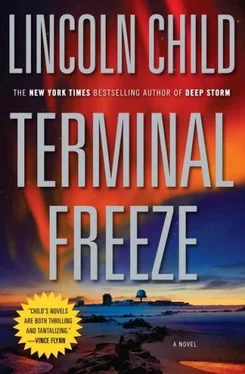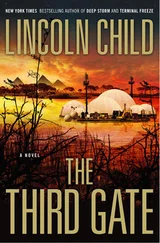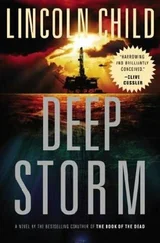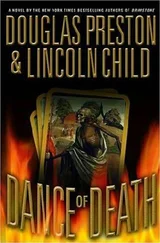“Ice fog,” Carradine explained. “The air can’t hold any more moisture.”
The strange mist began to envelope the truck like a cloud of black cotton. The visibility, poor to begin with, abruptly dropped to near zero.
“Can’t see a bloody thing,” Barbour said. “Slow down.”
“Can’t,” the trucker replied. “Can’t lose momentum.”
This new blindness, combined with the awful flexing and crackling of the ice beneath them, was simply too much for Barbour. She felt herself hyperventilating, drowning in anxiety. Hold on, luv, she told herself. Just hold on. Only a minute or two more.
And then they were through the cloud of ice-and now she could see the rocks of the far shore, at the very limit of the headlight beams. Relief flooded through her. Thank God.
Carradine took his eyes from the ice long enough to glance at her. “That wasn’t so bad, was it?”
Suddenly the truck gave a sharp lurch downward. At the same time there was a loud crack, like the report of a gun, just behind them. “Soft spot,” said Carradine, stepping heavily on the accelerator. “Weak ice.”
They pushed forward faster now, the big diesel whining. Another crack, louder, this one from directly below. Barbour saw that a split had formed in the ice and was now shooting out ahead of them with increasing speed, the two sections pulling apart. Carradine immediately compensated, maneuvering the truck so the crack stayed between the front wheels. But ahead the crack forked, once, twice, spreading across the ice at crazy angles like summer lightning. Carradine turned the wheel sharply, moving laterally over the webbing of cracks. The popping and snapping spiked abruptly in volume. Just then a brutal gust of wind caught the side of the truck. Barbour cried out as she felt the rear of the truck twist, then tilt alarmingly, threatening to jackknife and overturn on the collapsing ice.
“Spinout!” Carradine shouted. “Hold on!”
Barbour clung desperately to the stabilizer bar as the trucker fought to keep the big vehicle from rolling. Slowly, forward momentum brought them level to the ice. The far shore was just ahead now, less than fifty yards away. But the truck was still in a barely controlled spin. It collided with one of the shoreline rocks in a shuddering crash, lurched away, then stabilized. Carradine goosed the throttle again and the truck roared off the ice and back onto the washboard surface of the permafrost.
Barbour exhaled a long, shivering breath. Then she reached for the CB handset. “Fortnum, it’s Penny Barbour. Everyone all right back there?”
After a moment, Fortnum’s crackly voice replied. “A little shaken up but otherwise okay. What happened?”
“A gust of air caught us. But we’re off the ice now, and it should be clear sailing the rest of the way.”
As she replaced the handset, she happened to glance at Carradine. He was peering into his rearview mirror. Seeing the expression on his face, her anxiety returned.
“What is it?” she asked.
“That rock we hit,” he replied. “Looks like it holed our left tank.”
“Petrol tank? But don’t you have two?”
“The left tank was full. The right one isn’t. It’s only a third full.”
The feeling of anxiety spiked sharply. “But we’ve got enough to get to Arctic Village -don’t we?”
Carradine didn’t look at her. “No, ma’am. I don’t believe we do.”
They had worked quickly, in as little light as possible. Precisely how much the beast relied on sight, Gonzalez didn’t know-but there was no point making it any easier for the goddamned thing.
He tapped Phillips on the shoulder, then gestured toward the dimly lit intersection ahead. “Cover that corner,” he whispered. “I’ll make the final connections.”
“Yes, sir.”
“Signal the minute you hear anything.”
“Sir.”
He watched Phillips move down the hallway-a shadow among shadows-and take position near the intersection. Then he glanced at the hastily constructed setup immediately before him: half a dozen thick copper wires, hanging from the ceiling and suspended a foot over a shallow pool of water. Crude, but lethal enough once he’d finished. Then he slipped back through the doorway marked
MOTIVIC POWER STATION.
He stopped just inside, looking around at the complex arrays of cogs, couplings, shafts, rotors, and hydraulics. The substation housed the giant machinery once used to turn the radar dishes. He had chosen this particular room for three reasons: it was nearby, it had sufficient power, and it lay along the lone hallway that led out of this section of B Level. Sooner or later, the creature would have to come this way.
His eyes drifted to a far corner of the room, where Corporal Marcelin stood, weapon at his feet, trembling, eyes downcast. Then, picking up the loose ends of the copper wires-he and Phillips had run them over the pipes of the hallway ceiling and through the transom above the door-he headed toward the main electrical panel. Though the radar dishes hadn’t been spun up in almost half a century, the electrical connections that fed them were still operational. He’d just tested them himself: the fuses were a little powdery, the connections rusted, but they were still capable of plenty of current. Besides, he didn’t need to use the radar dishes-he just needed to run power to them.
How and why Sully and the others in the life-sciences lab thought electricity was the beast’s particular weakness, Gonzalez didn’t know and didn’t care. He was simply relieved-relieved as hell-to know it had one. Coming up with a plan, putting it into action, had taken fifteen minutes. And during that fifteen minutes he’d been too mercifully busy to think.
The main panel was set into the closest wall, fixed to the metal by four ceramic insulators. He opened its cover plate and shone his light inside. Four rows of heavy-duty fuses glinted back at him. He checked to make sure the mains were off, then used his pocketknife to strip the heavy insulation from the ends of the eight-gauge wires. As quickly as he could, he affixed the wires directly to one of the bus bars. He swept his gaze over the panel, ensuring that all the safeties were disconnected. Finally, he reached over, grasped the fail-safe lever beside the panel, and thrust it into the On position. There was a faint hum as the circuit went live.
Now the wires were crawling with six thousand volts and twenty amps of juice. That kind of voltage-three times the amount of an electric chair-would seize the heart of any beast, no matter how big. And Gonzalez wasn’t taking any chances: the twenty amps would cook it nicely, to boot.
He shifted the fail-safe lever back into the Off position and turned to Marcelin. “Come here, Corporal.”
For a minute, Marcelin didn’t seem to hear. Then he picked up his M16 and came forward on wooden legs.
“Wait here. When I give the word, throw this lever. Do it quickly. Got that?”
The corporal nodded.
“Take up position by the doorway. Wait until the thing has stepped into the water, made contact with the wires. Then open fire-and keep firing.”
Marcelin moved next to the electrical panel. Gonzalez took one last look at the jury-rigged connection, then stepped out into the hallway and took up his own position, careful to keep well away from the wires. He checked his weapon, ejected the magazine, knocked it gently against the ground, slapped it back into place. Now there was nothing to do but wait.
He gave his plan a quick run-through. It had been more than thirty years since he’d studied elementary engineering, but he remembered the basics well enough. Electricity passes easily through water. Organisms are mostly water, making them good conductors of electricity. So: hang enough live wires from the ceiling that the creature would have to come in contact with at least one, and hang them low enough so that it couldn’t crawl beneath. Pour enough water on the floor to create a shallow pool, and make sure it reached from wall to wall. Position the wires over the water and apply positive current. When the beast walked through the wires, it would complete the circuit-and good night, ladies.
Читать дальше












